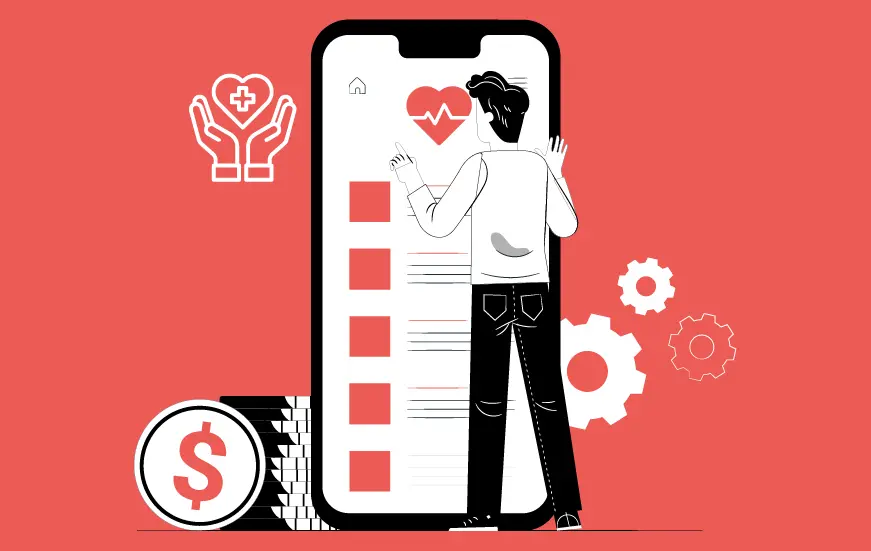- What is a Hospital Management System? A Quick Overview of the Workflow and Modules
- Patients
- Doctors
- Hospital Administration
- Admin
- Types of Hospital Management Systems
- Clinical Hospital Management System
- Operational Hospital Management Software
- Task-Based Hospital Management Software
- Subject-Based Hospital Information Management System
- Financial Hospital Database Management System
- Benefits of Hospital Management Software Development
- Enhanced Patient Care
- Improved Communication
- Streamlined Operations
- Cost Reduction
- Better Resource Management
- The Must-Have Features of Hospital Management Systems
- Patient-Focused Features of Hospital Management Software
- Features for Doctors in Hospital Management Software
- Administrative Features in Hospital Management Software
- Key Requirements for Developing an Effective Hospital Management System
- The Tech Stack Powering Hospital Management Software Development
- How to Create Hospital Management Software?
- Hospital Management Software Development Cost
- Locations-Wise Cost to Develop a Hospital Management System
- Build Efficient HMS with Appinventiv
- FAQs
Managing healthcare facilities is a multifaceted challenge that goes far beyond doctor-patient interactions. These facilities are complex systems requiring seamless coordination among various departments and staff to handle comprehensive processes of inventory tracking, supply management, financial oversight, appointment scheduling, resource allocation, and more. To navigate these complexities effectively, healthcare management requires advanced technological solutions that can keep pace with the current digital revolution.
This is where hospital management software development comes into play. It significantly enhances these internal processes and elevates hospital operations to new levels of efficiency. This advancement in efficiency has led to a massive rise in the number and types of hospital management systems being used globally.
The global market for hospital management software (HMS) is estimated at $57.47 billion in 2024 and is anticipated to reach $80.43 billion by 2029, which testifies to the rapid adoption of such systems worldwide.
In this article, we will be looking into the multiple facets of hospital management system development, helping you elevate the end-to-end healthcare experience. But let’s first start with a quick overview of the basics.
What is a Hospital Management System? A Quick Overview of the Workflow and Modules
In the healthcare industry, efficiency and organization are of utmost importance. A Hospital Management System (HMS) plays a crucial role in achieving this by streamlining various administrative and clinical operations. From patient registration to billing and beyond, HMS integrates all aspects of a hospital’s workflow into a unified system. But how?
The hospital management system software collects all the information about patients, doctors, hospital administrative details, and more in one software. This is the one approach that makes the entire process truly paperless.
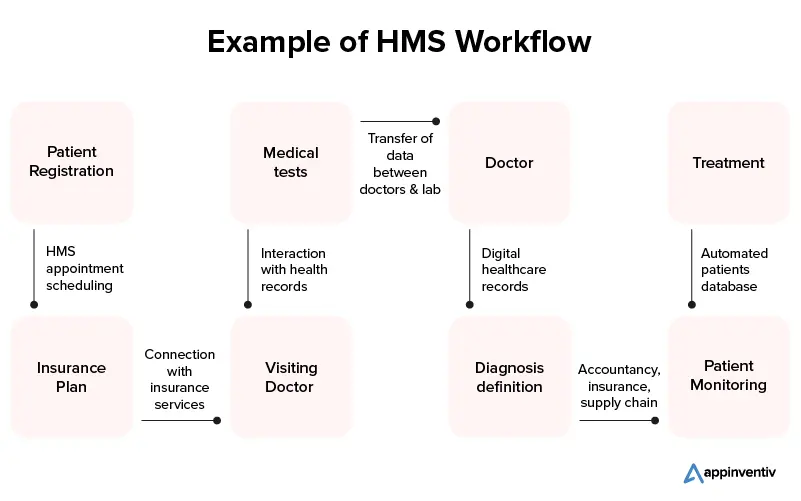
The essence of creating hospital management solutions lies in understanding that a hospital is not just about patients and doctors. Thus, there should be different modules addressing individual roles and divided by access-level data and features.
Let us look into what those modules are:
Patients
When patients come for their appointments, doctors register their names in the system. Once they are registered, they get a message or email with login details of their hospital management system profile.
Following this, they will be able to view their treatment plans, appointments, and billing details. The dashboard in the hospital management system also allows users to communicate with their doctors in real time through messages and calls.
Doctors
Next to patients, there is a separate module in any hospital information management system for doctors. Using this, the doctors can view:
- List of patients
- Patient’s medical data
- Appointment schedules
- Real-time messaging functionality
- Contact the hospital administrative team
- Contact vendors
The aim here is to make doctor-patient coordination hassle-free.
Hospital Administration
The hospital’s administration team uses the hospital management system to get holistic access to doctors’ and patients’ data like –
- List of patients treated in hospital
- List of doctors working in the hospital
- Doctors and patients profile with the treatment history
- Finance and legal information
Admin
The admin serves as the backbone of hospital management software development, providing essential support for various functions. It enables the hospitals to –
- Create roles
- See all the medical documents and profiles
- Link patients with doctors
- Create appointment schedules for doctors and patients
- Maintain vendors list
These modules play a crucial role in hospital management software development, helping businesses decide which types of hospital management systems to develop.
Types of Hospital Management Systems
HMS comes in various forms, each tailored to meet specific needs and challenges within the healthcare sector. Understanding the different types of HMS development is crucial for selecting the right solution to enhance operational efficiency and patient care. Here are some of the most common types of software for hospital management.
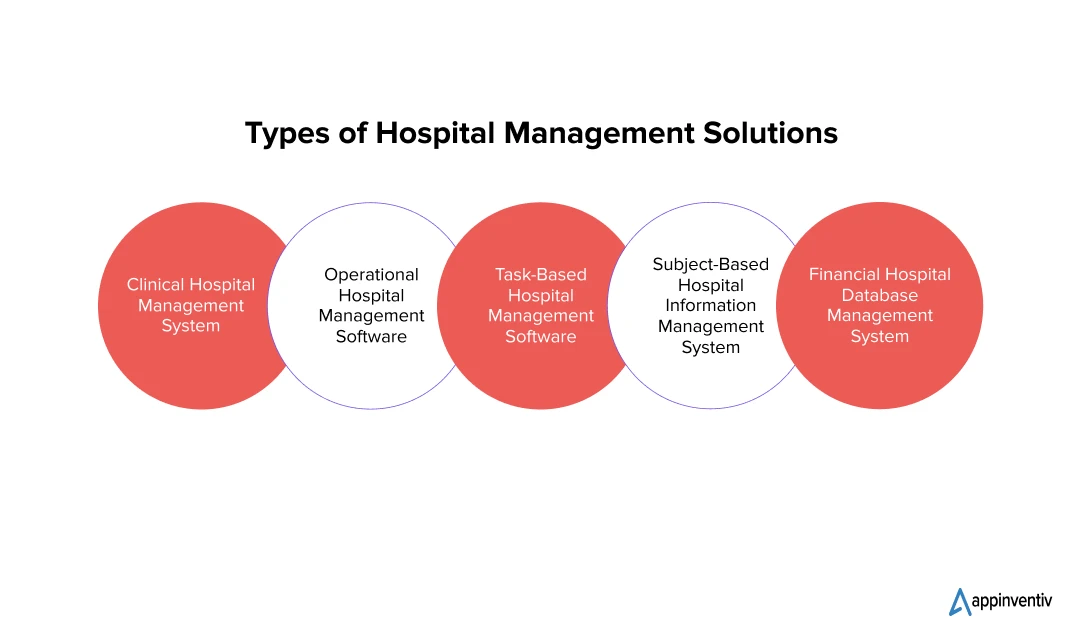
Clinical Hospital Management System
The clinical hospital management system contains patient information, statistics, and reports. After adding patients’ data to the system, a comprehensive report is generated. Moreover, using the same system, hospitals can view statistics of attendances, diseases, discharges, etc.
Operational Hospital Management Software
The benefits of this type of HMS lie in the classification of medical data. They provide the hospital staff with timely, consistent, and error-free data. Having well-categorized data in place helps hospitals deliver quality work both in-house and with patient interactions.
Task-Based Hospital Management Software
A task-oriented hospital management system enhances efficiency by prioritizing and allocating tasks based on the hospital’s needs. These systems focus on segmenting tasks into specific categories, like hospital admission, discharge, operation room transfer, etc.
Subject-Based Hospital Information Management System
A hospital management system designed around subjects focuses on the digital storage and management of patient data. The hospitals use these systems to securely maintain and organize patients’ medical histories, ensuring easy access and efficient data handling.
Financial Hospital Database Management System
This type of HMS is designed to oversee the financial aspects of healthcare facilities. They track cash flow and waste receipts, keeping a close eye on expenses and revenues to help hospitals manage their budgets effectively.
All the types and modules of hospital management software we have discussed above have a common goal: delivering comprehensive benefits for all stakeholders involved and improving patient care.
Benefits of Hospital Management Software Development
Hospital management software development offers a multitude of benefits that can significantly transform healthcare delivery and operational processes. By integrating advanced technology such as AI and Blockchain into daily operations, hospitals can leverage the maximum benefits of hospital management system development:

Enhanced Patient Care
With a wide range of hospital management software features (details later), hospitals can provide more personalized and timely care. Also, real time access to comprehensive patient data helps doctors make informed decisions, leading to better treatment outcomes.
Improved Communication
The software facilitates seamless communication among different departments and stakeholders, including doctors, nurses, administrative staff, and patients. This interconnectedness ensures that critical information is shared in real time, enhancing patient care and reducing the risk of miscommunication.
For instance, YouComm, one of the most notable examples of hospital management software, utilizes gesture recognition to improve care management by enabling seamless and real-time communication between healthcare professionals and patients, improving efficiency and patient care in medical settings.
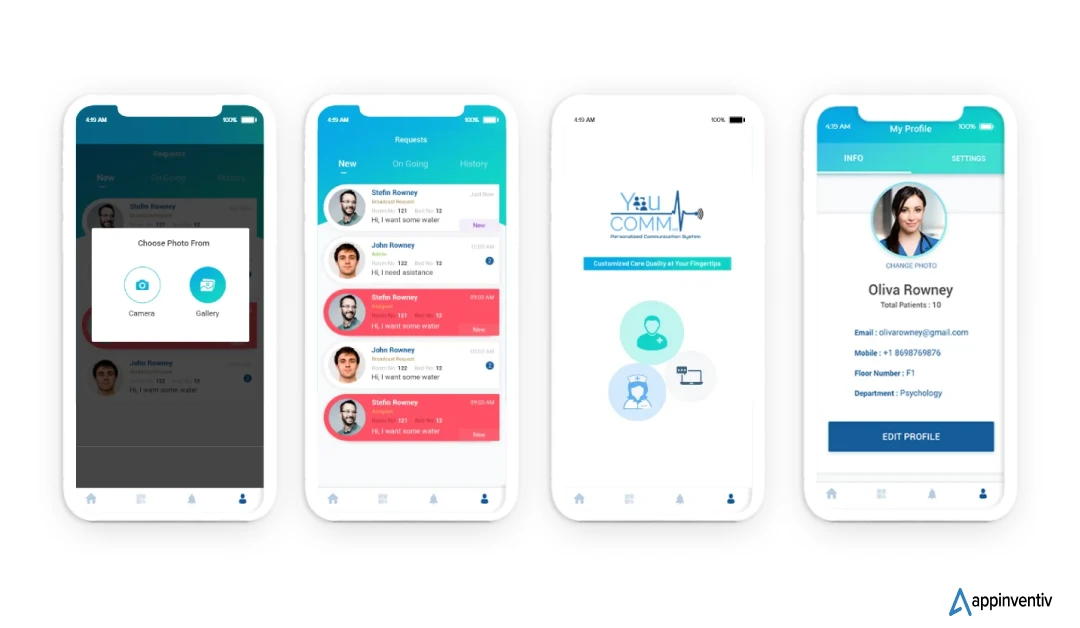
Streamlined Operations
Hospital management software automates and integrates various administrative and clinical processes, reducing manual errors and streamlining workflows. This leads to increased operational efficiency, allowing healthcare professionals to focus more on patient care rather than administrative tasks.
Cost Reduction
By automating routine tasks and optimizing resource allocation, hospital management software helps reduce operational costs. It minimizes the need for paperwork, lowers administrative expenses, and decreases the likelihood of costly errors.
Better Resource Management
Effective management of resources such as hospital beds, medical equipment, and staff scheduling is crucial for optimal hospital operations. Hospital management software helps track and allocate these resources efficiently, ensuring they are utilized to their full potential and stocked properly.
Now that we have discussed the types and benefits of building HMS, let’s delve into the essential features of a hospital management system.
The Must-Have Features of Hospital Management Systems
When embarking on the journey of hospital management software development, you work around multiple modules, each focusing on one specific stakeholder. Essentially, creating a comprehensive hospital management system involves building three interconnected applications. Let’s explore the features included in each of these modules.
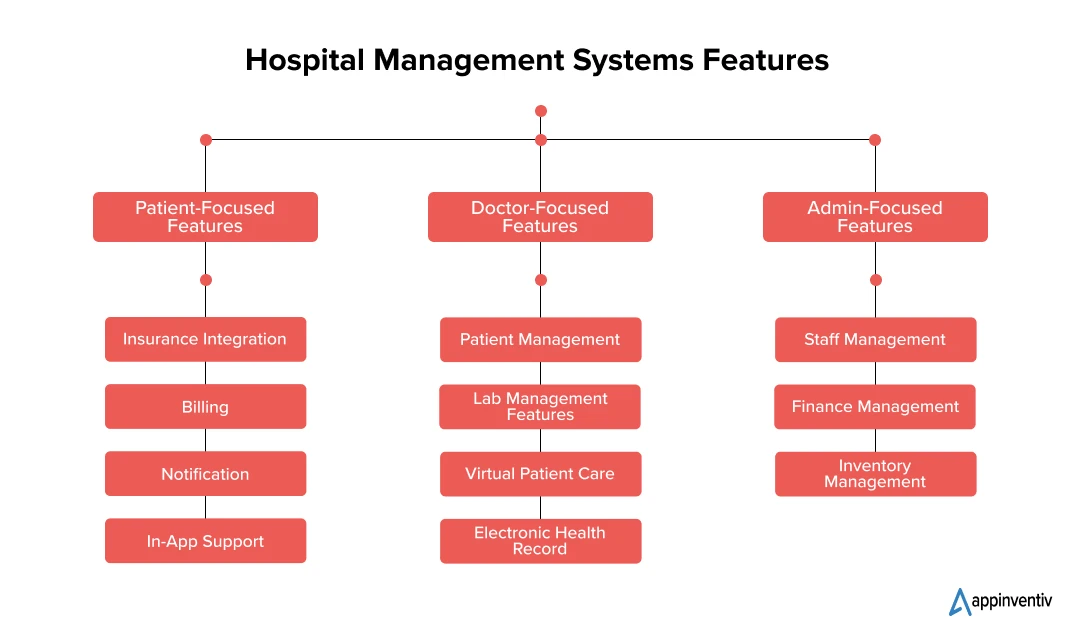 Patient-Focused Features of Hospital Management Software
Patient-Focused Features of Hospital Management Software
Hospital management software offers a range of features designed for patients, enhancing their healthcare experience.
Registration
A crucial feature of an HMS is to streamline the patient registration process, whether they walk in or schedule appointments online. This functionality allows hospital staff to quickly and efficiently input patient details.
Insurance Integration
This feature works around bringing patients’ insurance data into one place. This helps them with getting real-time information about which treatment is covered under their plan, in addition to easing up the claim process.
Billing
Every hospital management system typically includes the facility to pay bills. This enables patients to make payments, keep track of billing history, share data with their insurance firm, and keep track of upcoming payments.
Also Read: Cost of Custom Medical Billing Software
Notification
The push notification feature enhances patient engagement by sending timely reminders for medications, lab test results, upcoming appointments, and teleconsultation availability. This keeps patients informed and proactive about their healthcare.
In-App Support
This feature enables patients to contact the hospital admin directly from the healthcare app if they have any questions about their treatment or software usage.
Features for Doctors in Hospital Management Software
Doctors benefit from hospital management software through various features that support efficient clinical workflows and improve patient care.
Patient Management
This is one of the most crucial features when you build a hospital management system. It enables doctors to view patients’ data in real-time, access their conditions, and ensure that they get timely treatment.
Laboratory Information Management Systems (LIMS)
The LIMS feature eliminates the need for doctors to visit the lab to collect results. Instead, lab reports are instantly available on the hospital management software as soon as they are ready.
Virtual Patient Care
The next vital feature of hospital management system development is virtual patient care. This functionality enables doctors to connect with their patients in real-time irrespective of what time of the day it is.
Electronic Health Record
The doctor-side of hospital management software must include a secure EHR system. This system typically contains comprehensive data, such as:
- Billing and administrative data
- Patient demographics
- Doctors notes
- Vital signs
- Diagnosis and medication details
- Lab test results
- Medical histories.
Administrative Features in Hospital Management Software
On the administrative side, hospital management software provides tools for managing staff schedules, financial transactions, and facility operations. These features ensure smooth administrative processes and effective resource management.
Staff Management
A key feature of hospital management system software lies in managing the staff and doctors. It helps ensure that the staff is checking in and out on time, their work is organized, and all the necessary processes are being followed.
Finances Management
This is another key feature to consider for hospital management software development. The functionality enables hospitals to keep track of all the revenue and expenses, outstanding payments, issuance of salaries, and more.
Inventory Management
This feature enables hospital staff to efficiently track and manage inventories, including medicines, equipment, and furniture.
Key Requirements for Developing an Effective Hospital Management System
To create an effective HMS that meets the needs of medical institutions and enhances patient care, you need to address several key considerations and challenges of hospital management software development.
- User-Friendliness and Accessibility: The system must be designed with a user-friendly interface to ensure that all hospital staff can navigate it easily.
- Role-Based Access Control: HMS should provide role-based access for each staff member, ensuring that sensitive information is protected according to the individual’s level of authority.
- Regulatory Compliance: The software must adhere to industry standards such as HIPAA to ensure that it meets regulatory requirements for data protection and privacy.
- Real-Time Information Retrieval: The system must deliver timely and precise information to authorized personnel for efficient decision-making and responsive patient care.
- Scalability and Flexibility: A scalable architecture is a key requirement for hospital management system development ensuring the future growth without compromising performance.
Now that we know features and functions of hospital management systems, it is crucial to note that these functionalities will only deliver the expected benefits when it is powered by the right technology stack. Let us look into the essential tech stack you should use for hospital management system development.
The Tech Stack Powering Hospital Management Software Development
Although the choice of technology stack depends on the type of hospital management software you wish to build, we at Appinventiv use the following technology stack for HMS development:
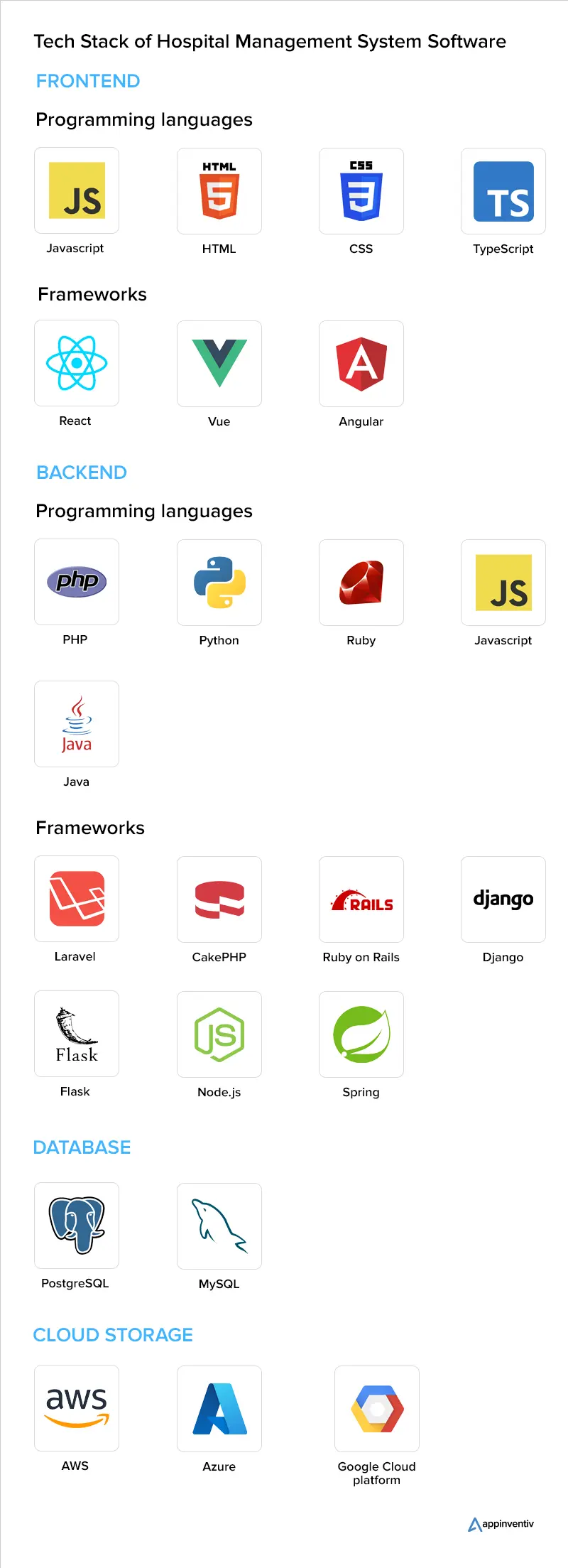
Now that we have looked into the technical side to note when you build a hospital management system, it is time to get down to the deciding factor that usually makes the entrepreneurs whether or not to go ahead with the project – the hospital management system cost.
How to Create Hospital Management Software?
Creating hospital management software involves a detailed and structured approach to ensure the system meets the diverse needs of healthcare providers. Here is a step-by-step guide to help you build a successful HMS:
- Define Requirements: Talk to doctors, nurses, and staff to understand their pain points and set clear goals.
- Choose Tech Stack: Pick the best front-end, back-end, database, and security technologies.
- Design UI/UX: Craft an intuitive and visually appealing interface that is easy to navigate.
- Develop Core Features: Create features for patient registration, health records, inventory tracking, lab results, billing, and notifications.
- Implement User Roles: Set up role-based access and keep track of user activities.
- Test Software: Test each part of the HMS, ensuring that everything works together and getting feedback from real users.
- Deploy: Integrate the software at the targeted platforms and train the staff on how to use it.
- Maintain and Support: Regularly monitor and maintain the HMS to keep it updated with the latest advancements and free from errors.
Hospital Management Software Development Cost
The cost of hospital management system development varies depending on a range of factors (already discussed above), such as –
- Features used to build HMS
- Platform compatibility
- Technology stack
- Location of development team and size
- Development model and so on
Let’s delve deeper into the other essential factors that influence the hospital management software development cost.
Locations-Wise Cost to Develop a Hospital Management System
When developing an HMS, the cost can vary significantly based on the details of specialists involved in the project development and the location of your development team. Here is a table outlining the estimated development cost of a hospital management system based on the average hourly rates of different specialists in various regions:
| Specialist | Number of Specialists | Hourly Rate (India) | Hourly Rate (Eastern Europe) | Hourly Rate (Western Europe) | Hourly Rate (North America) |
|---|---|---|---|---|---|
| Backend Developer | 3 | $50 | $60 | $100 | $120 |
| Frontend Developer | 2 | $45 | $55 | $90 | $110 |
| UI/UX Designer | 1 | $40 | $50 | $80 | $100 |
| QA Engineer | 1 | $35 | $45 | $70 | $90 |
| Project Manager | 1 | $55 | $65 | $110 | $130 |
This location-wise development cost range also varies greatly according to the complexity of the software. Let us look into what that would look like if you partner with an India-based hospital management software development company at an average rate of $50 per hour:
Product Discovery –
Small projects: 20-30 hours — $1000-1500
Middle-sized projects: 40-60 hours — $2000-3000
Enterprise-grade projects: 70-120 hours — $3500-6000
UI/UX design –
Small projects: 25-50 hours — $1250-2500
Middle-sized projects: 60-120 hours — $3000-6000
Enterprise-grade projects: 100-300 hours — $5000-15,000
Development –
Small projects: 9-10 hours (technical documentation), 60-80 hours (frontend), 90-110 hours (backend)
Middle-sized projects: 10-20 hours (technical documentation), 110-200 hours (frontend), 120-220 hours (backend)
Enterprise-grade projects: 30-50 hours (technical documentation), 300-600 hours (frontend), 400-700 hours (backend)
QA –
Small projects: 30 hours — $1500
Middle-sized projects: 30-70 hours — $1500-3500
Enterprise-grade projects: 70 hours — $3500
On average, the cost of hospital management system development ranges between $30,000 to $300,000 or more, depending on your unique project requirements and various other elements mentioned above.
You may like reading: Cost to Build a Healthcare App Like myAster
Build Efficient HMS with Appinventiv
The modern healthcare sphere is on the verge of complete digitalization, entering a space where all the stakeholders – patients, doctors, and clinics, are connected seamlessly. A way to ensure you are a part of it is to create a hospital management system.
While this article walked you through all the essential aspects of the hospital management software process, building a successful software would still require you to partner with a team that specializes in HMS-based healthcare software development services.
At Appinventiv, we have collaborated with numerous hospitals to streamline and integrate their processes, connecting all stakeholders – patients, doctors, hospital staff, and administrators. Our patient engagement-focused software services have led to better medical outcomes, reduced healthcare costs, and increased productivity for our clients.
Here are a few types of hospital management software that we develop for our clients:
- Custom Hospital Management Solutions
- Electronic Health Record (EHR)
- Electronic Medical Records (EMR)
- Hospital Information Systems (HIS)
- Appointment Scheduling and Management
- Medical Billing and Coding Software
- Healthcare CRM Software Development
- Laboratory Information Management Systems (LIMS)
- Hospital Inventory Management Systems
- Staff Scheduling and Administration Tools
- Telemedicine and Remote Care Solutions
- Compliance and Regulatory Reporting Tools
- Patient Portal Development and Support
- Diabetes Management Application
- Pharmacy Management Systems
- Medical IoT Solutions
Get in touch with us today to get your hospital management system developed and deployed in your medical settings.
FAQs
Q. What are the core features of hospital management software?
A. The features of hospital management software typically vary according to the stakeholders. Let us look into them briefly.
Patients’ side of the hospital software features
- Insurance integration
- Billing
- Notification
- In-app support
Doctors’ side of hospital software features
- Patient management
- Laboratory management
- Virtual patient care
- Electronic health record
Hospital side of hospital management software development
- Staff management
- Finances management
- Inventory management
Q. What is the cost to develop a hospital management system?
A. The cost to develop a hospital management system can vary widely based on several factors. On average, it can range from $30,000 to $300,000, considering factors such as the development team’s location, project’s complexity, the technology stack used, and the level of customization needed.
Discuss your project idea with us to get a more precise estimate for hospital management software development.
Q. How long does it take to develop a hospital management software?
A. The development timeline for a hospital management software typically ranges from 4 months to over a year. However, this timeline can vary significantly depending on the complexity of the system, the number of features, tech stack, developer’s expertise and the development methodology employed.
Contact us to get a more accurate timeline for your hospital management system development project.


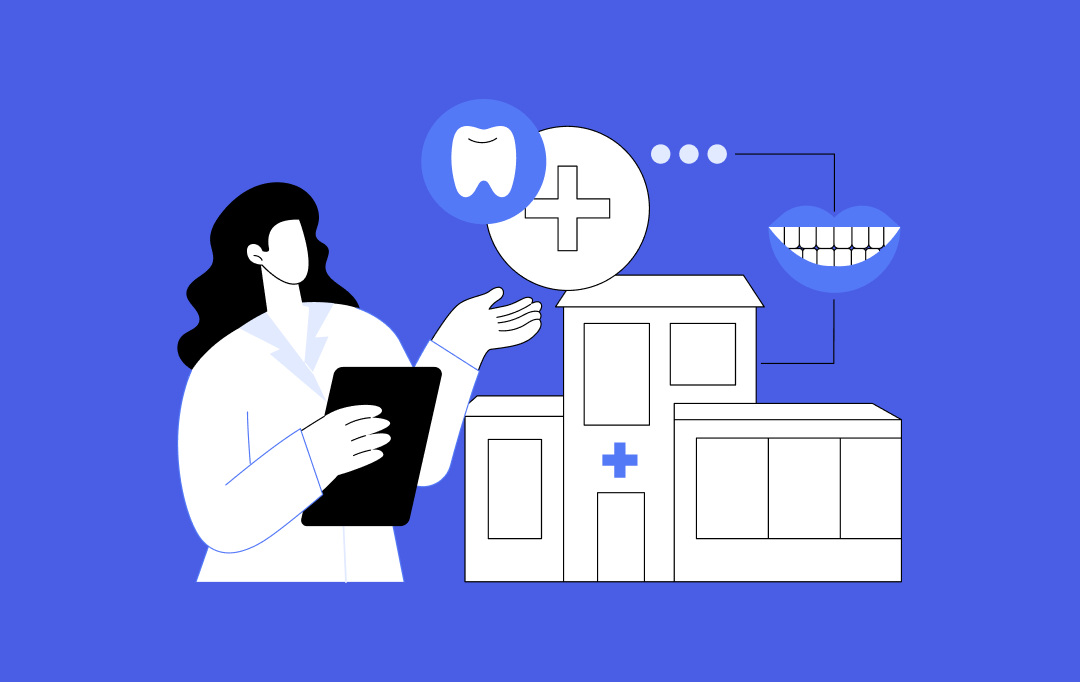
How Much Does it Cost to Build a Custom Dental Practice Management Software?
In recent years, dental practices have shifted away from manual, paper-based systems and embraced advanced software solutions. This change boosts efficiency, enhances patient experiences, and improves data management. While dealing with patient data, dentistry has ditched old-school methods like physical charts, appointment books, and manual billing. They’ve leveled up with a high-tech data handling &…

EMR Integration in Healthcare Systems - Benefits, Features, Process, Costs
EMR integration, having proved its worth in the healthcare space with improved workflows, better patient engagements, and lowered operational costs has built itself a projected market share of USD 20.7 billion. Eventhough a range of hospitals swear upon the benefits EMR system integration has garnered them, the adoption level digital healthcare industry anticipated has still…





